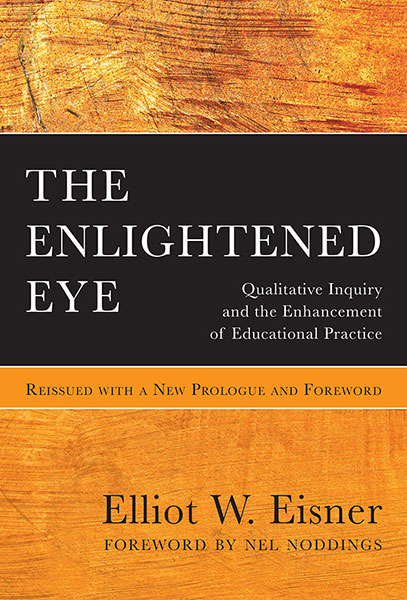Professors: Request an Exam Copy
Print copies available for US orders only. For orders outside the US, see our international distributors.
Foreword by: Nel Noddings
Publication Date: February 24, 2017
Pages: 288

Now available from TC Press with a new foreword by Nel Noddings and a new prologue by P. Bruce Uhrmacher and Christy McConnell Moroye, this classic text on qualitative research is ideal for both novice and established researchers. Eisner’s seminal work on mind, education, and research explores the ways in which the methods, content, and assumptions in the arts, humanities, and social sciences can help us better understand our schools and classrooms. The Enlightened Eye expands how we think about inquiry in education and broadens our views about what it means to “know” with the goal of positively influencing the educational experience of those who live and work in our schools. The text includes examples depicting this type of research and how it can be used to evaluate teaching, learning, and the school environment.
Book Features:
Elliot W. Eisner (deceased) is an esteemed educational researcher and pioneer in qualitative inquiry and arts-based research. He was professor emeritus of education and art at Stanford University.
“The Enlightened Eye, without dismissing technical-scientific studies, describes the benefits of qualitative research in some depth. It aims to open our eyes, pique our imagination, and encourage critical thought. With enhanced perception, reflection, and imagination, researchers and practitioners are better positioned to work collaboratively toward richer forms of education.”
—From the foreword by Nel Noddings, professor emerita, Stanford University
"Elliot Eisner was the most important art educator of his generation, and a true heir to John Dewey. In this splendid synthesis of his original work in the areas of art, curriculum, and education, Eisner presents a carefully reasoned, candid, and eloquent brief on behalf of qualitative forms of educational inquiry."
—Howard Gardner, Harvard University
Table of Contents
Foreword by Nel Noddings
Prologue by P. Bruce Uhrmacher & Christy McConnell Moroye
A Word of Thanks
Introduction
Chapter 1. Qualitative Thought and Human Understanding
Chapter 2. What Makes a Study Qualitative?
Chapter 3. Objectivity and Subjectivity in Qualitative Research and Evaluation
Chapter 4. Educational Connoisseurship
Chapter 5. Educational Criticism
Chapter 6. Validity in Educational Criticism
Chapter 7. A Closer Look at Educational Criticism
Chapter 8. The Meaning of Method in Qualitative Inquiry
Chapter 9. Do Qualitative Case Studies Have Lessons to Teach?
Chapter 10. Ethical Tensions, Controversies, and Dilemmas in Qualitative Research
Chapter 11. Looking Ahead: Preparing Qualitative Researchers
References
Index
Professors: Request an Exam Copy
Print copies available for US orders only. For orders outside the US, see our international distributors.